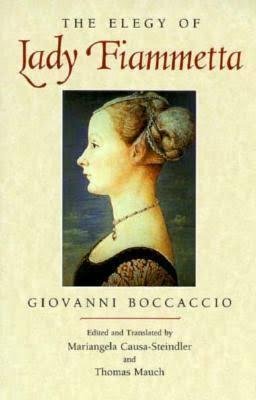The Elegy of Lady Fiammetta

INTRODUCTION
Giovanni Boccaccio tells the story of a Neapolitan noblewoman, Lady Fiammetta, who falls passionately in love with a young Florentine man named Panfilo. However, after Panfilo returns to Florence, leaving Fiammetta behind, she experiences deep despair and heartache due to his absence and the rumors of his new love in Florence. The narrative revolves around Fiammetta's emotional turmoil and her descent into despair, eventually contemplating suicide
SUMMARY
Fiammetta, the narrator, is a cultured and eloquent woman who has fallen in love with Panfilo, a Florentine merchant. Their love is passionate but illicit, as both are married to other people. After a period of intense romance, Panfilo is called back to Florence for business and promises to return soon.
However, he never comes back.
The novel unfolds as a dramatic monologue or a confession, in which Fiammetta describes her emotional descent into despair, jealousy, anger, and hopelessness. She suspects Panfilo has forgotten her or replaced her with another woman. The story is not action-driven but focuses deeply on Fiammetta’s psychological state, chronicling her torment in a series of introspective and poetic meditations.
ANALYSIS
Fiammetta is not an idealized heroine; she is complex, emotional, and at times irrational. Her introspection and self-criticism mark her as a vividly human figure. Despite being a fictional creation, her portrayal is so intense and realistic that she feels like a real person struggling with a broken heart.
PERSONAL RESPONSE
After reading the elegy of lady Fiammetta was a surprisingly emotional experience. I was struck by how modern Fiammetta’s voice felt, even though the work was written in the 14th century. Her inner turmoil, the way she overthinks every sign and moment of her relationship, and how she spirals into grief felt incredibly relatable. It reminded me how timeless the pain of love and loss really is.What stood out most to me was how Boccaccio gave such depth to a female character in a time when women were rarely portrayed with emotional complexity. Fiammetta isn't just a passive figure—she’s reflective, angry, vulnerable, and intelligent. I found myself feeling frustrated with her at times, but I also deeply sympathized with her loneliness and desperation. The elegy made me think about how personal heartbreak can become a kind of prison if we don’t find a way to move through it. Fiammetta’s voice lingers because she’s not just telling a love story—she’s revealing how fragile the human heart can be.
CONCLUSION
The Elegy of Lady Fiammetta is a powerful and emotionally resonant work that captures the depth of human suffering caused by love and abandonment. Through Fiammetta’s voice, Boccaccio not only explores the psychological effects of heartbreak but also gives rare insight into a woman’s inner world during the medieval period. Her pain, vulnerability, and self-awareness make her story timeless, reminding us that emotional struggles are a shared part of the human experience, regardless of time or place.







